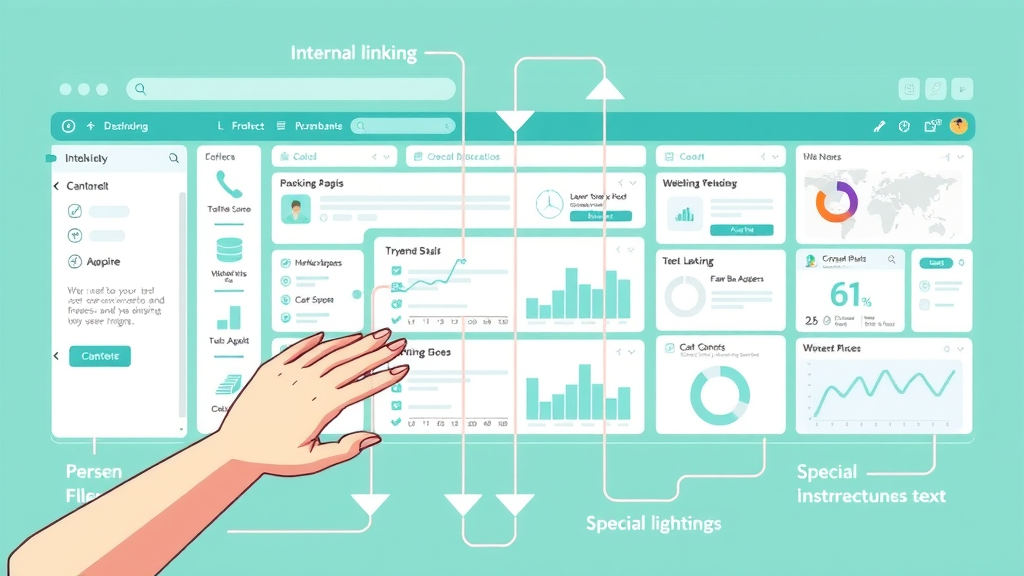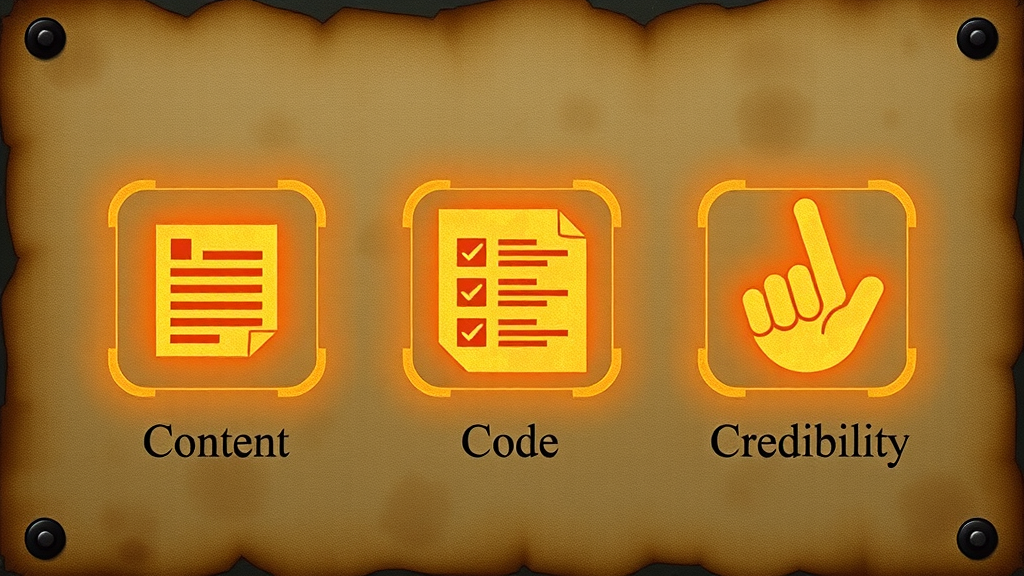Did you know that over 90% of consumers use search engines to find new local businesses, yet 70% of small businesses don’t have any SEO plan in place? If you're a small business owner striving to stand out in an increasingly digital world, mastering a few simple SEO tips for small business could dramatically increase your online visibility starting today . This guide unpacks proven strategies, local SEO secrets, and practical tools guaranteed to fuel growth and help you outrank your competitors—no technical background required.
Why SEO Tips for Small Business Matter: Surprising Facts That Influence Growth

Small businesses compete not just in their neighborhoods, but on Google Search and other search engines. Here’s why focusing on business SEO can make or break your growth: 46% of all Google searches are for local information, and being visible means you’re meeting potential customers where they already look. With most small companies lacking any SEO strategy, there’s a big opportunity to get ahead in local search results. The right approach means higher in search rankings , more foot traffic, and a bigger share of online attention.
- Over 90% of consumers use search engines to find local businesses
- 46% of all Google searches seek local information
- 70% of small businesses have no SEO strategy in place
"Small businesses that embrace SEO see up to a 200% increase in website traffic within one year." – Digital Marketing Institute
What You'll Gain from Applying SEO Tips for Small Business
Investing a few hours each month into SEO tips for small business pays big dividends. With the practical steps below, you’ll learn more than just the basics—you’ll come away knowing how to optimize your Google Business Profile, master local SEO, and leverage keyword research tools that drive measurable business seo growth. These tips make it easy to attract higher quality leads, improve your site’s authority, and track progress in real-time.
- Understand essential SEO strategies for small businesses
- Learn how to optimize your Google Business Profile
- Discover actionable local SEO tips designed for immediate impact
- Master keyword research and SEO tools for business growth
Understanding SEO Tips for Small Business: The Fundamentals

For small businesses , SEO is about delivering value to potential customers right where they’re searching. At its core, search engine optimization (SEO) means crafting your website and online presence so Google and other search engines showcase your business when local customers need you. Implementing the right business seo and local seo strategies ensures your site appears in top search results and stands above competitors in your industry.
What Is SEO and Why Is It Essential for Small Businesses?
SEO is the process of making sure your website, content, and online business profile are easy for people (and search engines) to find, understand, and trust. For small businesses, it’s the most cost-effective way to compete against bigger brands and connect with those searching for your solutions locally. By focusing on SEO tips for small business today, you’re building a foundation for sustainable growth and ongoing visibility in both local search and broader search engine results.
How Search Engines Rank Small Businesses in Google Search
Search engines use hundreds of signals to decide which businesses land at the top of the search results. The main factors include your site’s relevance (are you using the right relevant keywords ?), authority (do others link to your website?), and user experience (is your site fast and mobile optimized?). Understanding how Google and other engines analyze your content and local citations helps shape a winning seo strategy that increases the odds of appearing higher in search results for your target area.
Key Benefits of Implementing SEO Tips for Small Business
Effective SEO increases your organic traffic, positions you as a trustworthy local authority, and can reduce the need for costly paid advertising. With strong search engine optimization, your website gains greater visibility, attracts a higher volume of quality leads, and delivers sustained returns over time. Most importantly, SEO levels the playing field for small businesses ready to take control of their online presence.
"Without a strong SEO strategy, your small business risks being invisible online."
Keyword Research for Small Business and Business SEO Success
The heart of every successful SEO strategy is keyword research . Knowing the search terms your potential customers use allows you to target local seo content that brings visitors—and buyers—to your website. The right keyword plan uncovers search opportunities competitors overlook, shaping every part of your business seo approach.
How To Choose The Right Keywords for Local SEO and Search Engine Optimization

Start by brainstorming words and phrases customers might search for to find a business like yours. Next, use keyword research tools (many of which are free) to gauge the popularity and competition for these terms. Focus especially on local keywords—like “coffee shop Boston” or “plumbing services near me”—as these attract motivated searchers ready to buy or call. For each primary term, explore long-tail variations to capture specific, high-intent traffic for your small business.
Free and Paid Tools for Effective Keyword Research
Different keyword research tools offer various benefits. Google Keyword Planner is free with a Google Ads account and helps find local search volumes. Ubersuggest covers both free and paid options, making competitor analysis and business seo gap identification accessible. Ahrefs is a paid tool that delivers advanced competitive insights and keyword suggestions, ideal for businesses looking to deeply optimize and grow their content. Balancing free and paid solutions lets you cover all your keyword bases as you develop your small business SEO plan.
| Keyword Tool | Free/Paid | Best For | Example Use |
|---|---|---|---|
| Google Keyword Planner | Free | Finding search volume | Locally relevant terms |
| Ubersuggest | Free/Paid | Competitor analysis | Discovering business seo gaps |
| Ahrefs | Paid | Advanced insights | In-depth keyword research |
Analyzing Search Intent and Matching SEO Tips for Small Business
Not all keywords are created equal—understanding search intent is essential. Look at the search engine results for your chosen terms: is Google showing information articles, product listings, or local business directories? Align your page’s content to match what’s already ranking. For instance, if your small business wants to attract buyers, use “service + city” keywords and provide direct calls to action. Mapping content to search intent sets your site up for higher placement in local search and engine results.
On-Page SEO Tips for Small Business: Optimizing Quality Content
On-page SEO is what you control on your own website. For small businesses, that means investing in quality content , optimizing page structure, and guiding both users and search engines through smart links, structured data, and keyword use. When you consistently update and improve each part of your site, you boost both local seo and your overall authority in the search engine landscape.
Creating Quality Content That Drives Results

Every piece of content you publish—whether a blog post, landing page, or service description—should solve a problem for your potential customer. Focus on writing in-depth, helpful resources that answer common questions or guide readers through your services. Use your target keywords naturally, but always let user value come first. Keeping your content fresh and tailored to your target audience is the backbone of a great seo strategy for small business.
SEO-Friendly Page Titles, Meta Descriptions, and Headings
Your page titles and meta descriptions are what searchers see first in the search engine results. Craft clear, compelling titles using the main keyword naturally (such as “Quality Plumbing Services in Denver – Book Online Today”). Write meta descriptions under 160 characters, highlighting your unique selling points and local focus. Structure your page with H2 and H3 headings that also incorporate relevant keywords, making it easy for visitors and Google’s algorithms to grasp your site’s topic and value.
Internal Linking Structure for Small Businesses

Internal links connect the different pages of your website, helping both search engines and visitors find related content. A well-organized internal link structure distributes SEO authority, strengthens keywords, and guides users toward calls to action. Start by linking important service pages from your homepage, then connect related blog posts and key landing pages. Use descriptive anchor text, such as “learn more about our local SEO services,” to increase both relevance and engagement.
Using Images, Alt Tags, and Structured Data for Local Search
Images make your site visually appealing but also provide SEO opportunities. Always add descriptive alt tags with local keywords (“best bakery in Atlanta storefront”). Implement structured data (like local business schema) to enhance your listings in Google Search and boost your credibility in local search results. These behind-the-scenes tactics help Google display your business with photos, star ratings, and quick info boxes, driving more clicks and conversions.
"Quality content remains the single most effective SEO asset for small business."
Local SEO for Small Business: Outrank Your Neighborhood Competitors
When small businesses master local SEO , they become the clear choice for nearby customers. Local SEO focuses on optimizing your business presence within Google, online maps, local directories, and community networks. Small businesses that consistently invest in local citations, reviews, and Google Business Profile updates see remarkable growth—both in online leads and real-world sales.
Google Business Profile Optimization for Business SEO
Your Google Business Profile (formerly Google My Business) shapes how you appear in Google Maps and local search results. Complete every field—services, categories, hours of operation—and regularly add high-quality photos showcasing your location, products, and staff. Encourage satisfied customers to leave positive reviews and always respond, showing you care about feedback and community engagement. Frequent updates and interactions send strong trust signals to search engines.
- Complete every field of your Google Business Profile
- Add high-quality images relevant to your local area
- Encourage customer reviews and respond publicly
Local Search and Citations: NAP Consistency Across the Web

Citations refer to mentions of your business’s Name, Address, and Phone number (NAP) on other websites—local directories, social media, and review sites. Consistent, accurate NAP data is essential for local seo: discrepancies confuse Google and cost you rankings. Audit your business listings regularly and update them wherever needed. The more reliable your citations, the stronger your online presence in local search and business seo results.
Managing and Monitoring Reviews for Local SEO Power
Online reviews are digital word-of-mouth—powerful trust signals for new customers and search engines alike. Set up a process for requesting reviews after successful purchases or services, respond to every review (positive or negative), and highlight top feedback on your website. Don’t ignore negative comments: addressing concerns professionally demonstrates your commitment to service excellence, further boosting your credibility with Google and your community.
Embedding Local Schema Markup for Enhanced Search Engine Visibility
Schema markup is a form of code you add to your website that helps Google understand specific details about your business: location, hours, reviews, and more. For small businesses, local schema can improve your chance of appearing in coveted “map packs,” knowledge panels, and other prominent search results. Use free generators or plugins to add structured data, ensuring you stand out in the eyes of both customers and search engines.
Technical SEO Tips for Small Businesses: Behind-the-Scenes Wins
Technical SEO isn’t just for web developers—it’s the backbone of a fast, secure, and mobile-friendly business website. Optimizing site performance helps search engines crawl, index, and rank your pages more effectively, leading to dramatic improvements in both user experience and Google search results.
Mobile Optimization for Google Search and Search Engines

With the majority of local searches happening on mobile devices, optimizing your website for smartphones and tablets is critical. Use a responsive design that adjusts content layout based on screen size. Keep navigation intuitive, load times fast, and clickable elements easy to interact with. Prioritizing mobile optimization not only delights users but is a direct ranking factor in Google’s search engine algorithms.
Improving Site Speed and Secure Hosting
Slow websites drive visitors—and potential customers—away before they even see your content. Compress images, leverage caching, and minimize unnecessary plugins or code. Choose secure, reputable hosting (look for HTTPS and regular uptime monitoring) to protect your site and customer data. Speed and security are priorities for both small business owners and Google’s quality standards.
Implementing Google Analytics and Google Search Console
Set up Google Analytics and Google Search Console from day one. Analytics lets you measure organic traffic, popular pages, and audience behavior, while Search Console provides crucial data on search ranking, crawling errors, and indexing health. Reviewing these insights helps you fine-tune your SEO strategy and catch issues before they can hurt your online presence.
Fixing Broken Links, Duplicate Content, and Crawl Errors
Technical errors can quietly drag down your site’s search rankings. Conduct regular website audits using free or paid tools to find and fix broken links, duplicate content, and crawl issues. Cleaning up these problems ensures Google can access, understand, and reward all the pages on your site, maximizing your visibility for every relevant search.
- Use Google Analytics to identify traffic patterns
- Set up Google Search Console to monitor search engine performance
- Run regular site audits to fix technical errors
Building Your Small Business Backlink Profile for SEO Authority

A strong backlink profile signals to Google and other search engines that your site is trustworthy and authoritative. For small businesses, earning relevant, high-quality links is one of the fastest ways to boost your business seo and climb the search rankings—especially in your local area.
Why Backlinks Still Matter in Engine Optimization
Backlinks—links to your website from respected sites—act as endorsements in the eyes of search engines. Not all links are created equal: aim for backlinks from reputable, local, or industry-related sites, which carry more weight and relevance for both business seo and local seo.
How Small Businesses Can Strategically Earn High-Quality Backlinks
Focus on relationship-building and community involvement to generate backlinks organically. Contributing guest posts to local blogs, collaborating with associations, and supporting community events are proven ways to earn both attention and credibility for your small business. Use PR opportunities, publish press releases, or offer expert insights to local media—you’ll gain links and boost your local reputation.
- Guest posting on local sites
- Partnerships with associations
- Encouraging media coverage of community events
Leveraging Social Media and Business Profiles for Link Building
Don’t overlook your social presence. Filling out business profiles on platforms like LinkedIn, Facebook, and Yelp not only sends business signals to Google, but also provides valuable backlinks. Sharing your blog content, resources, and local news attracts both engagement and more linking opportunities from nearby organizations and influencers—all feeding into your overall SEO authority.
SEO Strategy for Small Businesses: Building, Measuring, Improving
A sustainable SEO strategy for small business is about constant improvement. Set clear goals, measure key outcomes, and adapt as you learn what works. Using data as your guide ensures every change brings greater traffic, more leads, and a growing online presence.
Crafting a Long-Term SEO Strategy vs. Short-Term Hacks
Shortcuts may promise quick wins but rarely last. Invest in foundational strategies—consistent, quality content , accurate listings, and ongoing optimization. These build lasting value that outperforms fly-by-night tactics. Make SEO an ongoing part of your marketing strategy: review and refresh your approach monthly or quarterly to stay ahead of changes in search engine algorithms or customer behavior.
Using Google Analytics & Google Search Console to Track Success

Set benchmarks and review metrics like organic traffic, top landing pages, bounce rates, and conversions weekly or monthly. Google Analytics highlights user behavior and traffic sources, while Search Console provides data on impressions, click-through rates, and search positions. This feedback loop helps small businesses double down on what delivers results and spot new business seo opportunities as your market evolves.
| Metric | Tool | Action |
|---|---|---|
| Organic Traffic | Google Analytics | Track audience growth |
| Search Impressions | Search Console | Discover ranking opportunities |
Iterative SEO: How to Continue Growing Your Small Business Online
SEO is never “done.” Review your search rankings and business metrics regularly. Refresh old content, target new keywords, and update local listings as you expand or relocate. Stay ahead of competitors by experimenting with new SEO tactics, monitoring algorithm updates, and seeking feedback from your customers on how they found you. Small, consistent improvements keep your business climbing the search ladder year after year.
Step-by-step instructional video demonstrating foundational SEO techniques for small businesses, including keyword research, Google Business Profile optimization, content creation, and basic analytics, featuring screen recordings and voiceover guidance.
People Also Ask: How to improve SEO for small business?
Actionable Ways to Improve SEO for Small Business
Improving SEO for small business starts with the basics: use free keyword tools to create a keyword plan, update business profiles on all local directories, publish fresh location-based content, and request customer reviews often. For quick wins, focus on content that solves real customer problems, check your Google Business Profile regularly, and keep local citations accurate. These steps help small businesses stand out in crowded local search results.
- Access free tools for keyword research
- Update local business citations
- Write location-rich content
- Encourage customer reviews
People Also Ask: What are the 3 C's of SEO?
Defining the 3 C's of SEO for Small Businesses

- Content: High-value, relevant content that matches search intent
- Code: Technical foundation and optimization
- Credibility: Earning trust through backlinks and reviews
People Also Ask: What are the 4 pillars of SEO?
Exploring the 4 Pillars of SEO Tips for Small Business
- Technical SEO
- Content Optimization
- On-Site SEO
- Off-Site Authority Building
People Also Ask: Does SEO really work for small businesses?
Examining the Effectiveness of SEO for Small Businesses
When executed with a clear seo strategy, SEO is often the best long-term investment for small businesses looking to grow online. Focus on consistent optimization, relevant keyword research, local reviews, and backlink building—results may take a few months, but they compound over time. Small businesses that persist with SEO almost always report greater online visibility, better quality leads, and more organic traffic than those relying on paid ads alone.
"SEO delivers a higher ROI for small businesses than nearly any other marketing channel when executed strategically." – Moz
Discover real-world examples of small businesses that have leveraged SEO tips and local seo best practices to dramatically grow their reach, revenue, and reputation—featuring before and after analytics and business owner testimonials.
Frequently Asked Questions About SEO Tips for Small Business
- How often should my business update SEO content? Review and refresh your content every few months. Consistent updates improve your rankings and ensure you remain relevant to both search engines and customers.
- Are there affordable SEO tools for small businesses? Yes, free tools like Google Keyword Planner, Ubersuggest, and Google Search Console are powerful and perfect for small business budgets.
- Should small businesses hire an SEO agency or DIY? Many start DIY, using guides like this. If you lack time or need faster results, hiring an expert can accelerate your progress.
- What is the best way to monitor SEO progress? Set up Google Analytics and Google Search Console to check traffic, rankings, and site performance. Regularly track progress to identify growth areas.
Checklist: Essential SEO Tips for Small Business

- Register and optimize your Google Business Profile
- Conduct keyword research monthly
- Update quality content regularly
- Build local business citations
- Track SEO results with Google Analytics
Summary: Key Takeaways for Actionable SEO Tips for Small Businesses
- Master the basics of search engine optimization
- Local SEO can fuel fast results for small businesses
- Consistent content updates and backlinks boost visibility
- Track performance with reliable SEO tools
Exclusive interview with a search engine optimization specialist sharing advanced business seo and local seo insights, plus interactive Q&A for small business owners.
Start Growing: Implement SEO Tips for Small Business with Trimedia Social
"Ready to supercharge your small business? Book a strategy session with our Trimedia Social team today! 770-299-2828"
 Add Row
Add Row  Add
Add 

Write A Comment